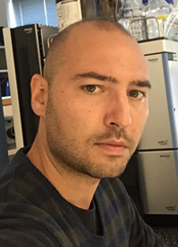Crnic Institute Grand Challenge Grants
 The Global Down Syndrome Foundation raises funds for the Linda Crnic Institute for Down Syndrome to underwrite critical research benefiting people with Down syndrome. To date, we have provided $6.7 million in research grants to 33 investigators. Of the $6.7 million, the most important grants today are (1) the Crnic Grand Challenge Grants totaling nearly $3.5 million and (2) the Alzheimer’s disease-Down syndrome innovation grants co-funded with the Alzheimer’s Association.
The Global Down Syndrome Foundation raises funds for the Linda Crnic Institute for Down Syndrome to underwrite critical research benefiting people with Down syndrome. To date, we have provided $6.7 million in research grants to 33 investigators. Of the $6.7 million, the most important grants today are (1) the Crnic Grand Challenge Grants totaling nearly $3.5 million and (2) the Alzheimer’s disease-Down syndrome innovation grants co-funded with the Alzheimer’s Association.
The Crnic Grand Challenge Grants program was established in 2013 by Tom Blumenthal, Ph.D., executive director of the Crnic Institute. The grants are available to scientists from the University of Colorado system and were awarded to researchers from various disciplines at the University of Colorado at Boulder, and the University of Colorado School of Medicine at the Anschutz Medical Campus.
2017 Crnic Grand Challenge Grant Recipients
Many of the 2017 grants awarded build on seminal research published last year, a result of previous Crnic Grand Challenge Grants, recasting Down syndrome as an immune disorder.
Read the press release about the 2017 Crnic Grand Challenge Grants.
2016 Crnic Grand Challenge Grant Recipients
The eleven recipients of the Crnic Grand Challenge Grants will focus on a range of subjects with a focus on the immune system in Down syndrome. Increasing evidence suggests that malfunction of the immune system in people with Down syndrome may be linked to their higher risk for leukemia, autoimmune disorders, and cognitive impairment. The Crnic Institute and the Global Down Syndrome Foundation provided awards to four investigators focused on this striking correlation.
Read the press release about the 2016 Crnic Grand Challenge Grants.
2015 Crnic Grand Challenge Grant Recipients
Thirty-one researchers from the University of Colorado at Boulder and the University of Colorado School of Medicine on the Anschutz Medical Campus applied for the 2015 Crnic Grand Challenge Grants. The proposals were reviewed by an elite group of scientists, and 10 exceptional research projects were selected. Each Linda Crnic Institute Grand Challenge Grant has the real potential to benefit people with Down syndrome. These grants will ensure that we create a true academic home for Down syndrome research in addition to funding research on a national and international basis.
Read the press release about the 2015 Crnic Grand Challenge Grants.
2014 Crnic Grand Challenge Grant Recipients
Thirty-three grant proposals were reviewed by an elite group of scientists, and 13 exceptional research projects were selected.
Read the press release about the 2014 Crnic Grand Challenge Grants.
2013 Crnic Grand Challenge Grants Recipients
Thirty-six grant proposals were reviewed by an elite group of scientists, and 14 exceptional research projects were selected.
Read the press release about the 2013 Crnic Grand Challenge Grants.
Grand Challenge Grants Recipients
Brianne Bettcher, Ph.D.
2016 Grant Recipient
Assistant Professor of Neurosurgery at the University of Colorado School of Medicine on the Anschutz Medical Campus
We will investigate the correlation between biomarkers of inflammation, brain structure, and neuropsychological functioning in adults with Down syndrome with an emphasis on those with early stages of Alzheimer’s disease.
Ganna Bilousova, Ph.D.
2016 Grant Recipient
Assistant Professor, Department of Dermatology, University of Colorado School of Medicine, Anschutz Medical Campus
Exploring Endothelial Progenitor Cell Defects in Down Syndrome
 Zhe Chen, Ph.D.
Zhe Chen, Ph.D.
2014 Grant Recipient
Research Assistant Professor of Molecular, Cellular and Developmental Biology, University of Colorado at Boulder
Characterizing axon guidance phenotypes in Down syndrome models
People with Down syndrome have brain abnormalities causing cognitive deficits. These deficits may be due to failure of nerve cell axons to find their proper place in the brain. Several genes on human Chromosome 21 may play important roles in this process, and axon guidance errors may cause these cognitive deficits. It is currently unknown if trisomy 21 perturbs the function of these genes and consequently leads to axon guidance defects. Using mouse models for Down syndrome, this research group will characterize potential cellular and molecular abnormalities in axon guidance. Future results will determine if axon guidance errors contribute to the cognitive disability in Down syndrome, and thus provide a novel perspective in understanding the causes of cognitive deficits.
Angelo D’Alessandro 
2016 Grant Recipient
Associate Professor, Department of Biochemistry and Molecular Genetics
Metabolic Alterations of Trisome 21
James DeGregori, Ph.D.
2014, 2013 Grant Recipient
Professor, Biochemistry and Molecular Genetics, University of Colorado School of Medicine
Oncogenic adaptation, leukemogenesis and Down syndrome
Down syndrome is associated with a striking increase in leukemia, but decrease in many solid tumors. This research group will continue to test a novel idea linking impaired blood cell production and increased leukemia in individuals with Down syndrome. They suggest that defects in the ability of blood cells to replenish their numbers lead to selection for mutations in potential cancer causing genes that can overcome this defect. Using mouse models, they will ask whether particular cancer-causing events are specifically selected for within blood stem cells in Down syndrome. They will also determine how the extra Chromosome 21 impacts selection for these cancer-causing genes in other tissues, which could explain both increased leukemias as well as decreased solid tumor formation. In all, these studies could suggest a novel approach to limiting cancer: if we understand what leads to the cancer, we have a much better chance of finding cures.
 Mark Dell’Acqua, Ph.D.
Mark Dell’Acqua, Ph.D.
2014 Grant Recipient
Professor of Pharmacology, University of Colorado School of Medicine
Amyloid Beta postsynaptic signaling through anchored calcineurin
In Alzheimer’s disease, overproduction of amyloid beta (Aβ) protein fragments from the amyloid precursor protein (APP) somehow interferes with the normal signaling functions of brain synapses, which causes dementia. The APP gene is on Chromosome 21, so people with Down syndrome have extra APP and Aβ in their brains, and many develop early-onset Alzheimer’s disease. Figuring out how Aβ interferes with synapes is key for understanding Alzheimer’s disease and could result in the identification of novel drug targets and therapies. Using an innovative genetically engineered mouse model, this research group will determine whether Aβ activates signaling that interferes with synapses through a protein called Calcineurin. This protein is anchored at synapses by a protein called AKAP150. They will investigate whether disruption of AKAP150 can prevent synapse dysfunction caused by the presence of Aβ.
 Robin Dowell, Ph.D.
Robin Dowell, Ph.D.
2014, 2013 Grant Recipient
Assistant Professor, Molecular, Cellular and Developmental Biology and BioFrontiers Institute, University of Colorado at Boulder
Allele specific transcriptional and post-transcriptional regulation in Down syndrome
This research group will experimentally determine which RNAs are dysregulated in individuals with Down syndrome. They will also determine which step of regulation is altered: transcription of the gene into RNA or stability of the RNA. Using novel techniques, and comparing their results to the genome sequence, they will identify the key regulators responding to trisomy 21. Ultimately, a detailed understanding of the impact of trisomy 21 on gene regulation is necessary to develop targeted molecular therapeutics.
Joaquin Espinosa, Ph.D.
2013 Grant Recipient
Associate Professor, Molecular, Cellular and Developmental Biology, University of Colorado at Boulder
A genetic screen for synthetic lethal pathways with Trisomy 21
The Espinosa lab will scan the human genome in search of genes whose function is essential for the survival of cells with three copies of chromosome 21, yet dispensable for cells with only two copies. The identification of these genes will illuminate the molecular processes that allow the cells of individuals with Down syndrome to accommodate the burden of an additional chromosome. This knowledge may eventually enable the design of therapeutic strategies for these genes.
Santos Franco, Ph.D.
2017 Grant Recipient
Assistant Professor of Pediatrics at University of Colorado School of Medicine on the Anschutz Medical Campus
Defects in Neurogenesis and Neuronal Migration in DS Mouse Models: Elucidating the Developmental and Molecular Mechanisms
Csaba Galambos, MD, Ph.D.
2017 Grant Recipient
Pathology and Laboratory Medicine, Associate Professor, University of Colorado School of Medicine on the Anschutz Medical Campus
Overexpression of anti-angiogenic genes impairs lung development in Dp16 mice
This lab will determine if abnormal lung development results from a low blood supply due to over expression of a gene whose protein product inhibits new blood vessel growth.
 Fran Hickey, M.D.
Fran Hickey, M.D.
2013 Grant Recipient
Anna and John J. Sie Center for Down Syndrome Medical Director
Professor, Pediatrics, University of Colorado School of Medicine
The pharmacokinetics of morphine in post-operative cardiac patients with Down syndrome
This study will use blood samples from children with and without Down syndrome undergoing cardiac surgery. The study will provide information to improve the management of post-operative pain and sedation in children with Down syndrome, including those with congenital heart disease. Knowledge about the metabolism of morphine in these patients will guide dosing and help limit the risks and side-effects that these patients are exposed to in all clinical situations where pain control is needed.
 Charles A. Hoeffer, Ph.D.
Charles A. Hoeffer, Ph.D.
2015 Grant Recipient
Assistant Professor, Department of Integrative Physiology, Institute for Behavioral Genetics, University of Colorado at Boulder
Targeting dysregulated mitochondrial activity in DS-related Alzheimer’s disease
Hoeffer’s study will test the idea that overexpression of Regulator of calcineurin 1 (RCAN1), a key gene on chromosome 21, promotes the development of Alzheimer’s disease-related neuropathology in Down syndrome.
Elena Hsieh, MD 
2017 Grant Recipient
Assistant Professor of Immunology and Microbiology at University of Colorado School of Medicine on the Anschutz Medical Campus
Understanding the Hyperactive Interferon Response in Trisomy 21 at the Single-Cell Level
 Aaron Johnson, Ph.D.
Aaron Johnson, Ph.D.
2014 Grant Recipient
Assistant Professor of Biochemistry and Molecular Genetics, University of Colorado School of Medicine
Profiling Chromosome 21 inactivation by the Xist RNA
All chromosomes are composed of the genetic material (DNA) and many proteins that influence the expression of the DNA. This project will determine the protein composition of Chromosome 21 by re-building the interactions with this chromosome in the test tube. This research group will use this protein composition “signature” as a guide to study a recently developed RNA molecular therapy that can inactivate one of the three copies of Chromosome 21 in trisomic cells. This therapy has the potential to alleviate health complications for people with Down syndrome.
 Kevin Jones, Ph.D.
Kevin Jones, Ph.D.
2015, 2013 Grant Recipient
Associate Professor, Molecular, Cellular and Developmental Biology, University of Colorado at Boulder
BDNF augmentation as a therapeutic treatment for Down syndrome
There is evidence that reduced signaling between neurons mediated by growth factors, a class of signaling proteins that influence the health and function of cells, may be a significant contributor to the intellectual disability that occurs in Down syndrome. The Jones lab will test whether increasing the abundance of one specific growth factor can prevent Down syndrome pathology in a mouse model. They will screen for drugs that increase the abundance of this growth factor with the goal of developing therapeutic drugs for the treatment of Down syndrome.
 Matthew Kennedy, Ph.D.
Matthew Kennedy, Ph.D.
2015, 2013 Grant Recipient
Assistant Professor, Pharmacology, University of Colorado School of Medicine
Mechanisms of beta-amyloid synapse elimination
Certain features of Down syndrome brain pathology closely resemble Alzheimer’s disease. One of the hallmarks of Down syndrome and Alzheimer’s is the loss of neuronal contacts, or synapses, in the brain. Loss of synapses leads to cognitive symptoms associated with these conditions and is thought to be a result of increased production of a toxic peptide called beta-amyloid. The Kennedy lab will investigate how beta-amyloid causes synapse loss in hope of finding targets for future therapies.
 Mike Klymkowsky, Ph.D.
Mike Klymkowsky, Ph.D.
2016 Grant Recipient
Professor, Department of Molecular, Cellular and Developmental Biology, University of Colorado Boulder
Inductive signaling in human iPSC-derived euploid and trisomic 21 cerebral organoids
Laurel Lenz, Ph.D.
2017 Grant Recipient
Professor of Immunology at University of Colorado School of Medicine on the Anschutz Medical Campus
Mechanisms responsible for increased type I IFN responses in Trisomy 21
Christopher Link, Ph.D. 
2014, 2013 Grant Recipient
Associate Professor, Integrative Physiology, University of Colorado at Boulder
Transcriptome analysis in iPSC-derived and directly reprogrammed neurons from Down syndrome cells
Down syndrome results from an extra copy of Chromosome 21, and it is believed that the resulting extra copies of genes of this chromosome lead to Down syndrome traits. Presumably the extra copies of Chromosome 21 genes results in the higher expression of these genes. It is this increased expression of a subset of genes that results in specific Down syndrome traits, such as intellectual disability. However, it has been difficult to directly test this assumption, or identify the critical genes, due to the experimental inaccessibility of human tissue, particularly the brain. Newly developed technology now enables researchers to convert human skin cells into neurons and to mimic aspects of human brain development in a cell culture dish. This research group will use these technologies to generate neurons from individuals with Down syndrome, and measure expression of all the genes from every chromosome. One idea they will test is that overexpression of one specific gene on Chromosome 21 may alter the function of a set of proteins involved in neurotransmission. Support for this idea would identify specific proteins as candidate drug targets to alleviate brain deficits found in individuals with Down syndrome, such as epilepsy and intellectual disability.
 Changwei Liu, Ph.D.
Changwei Liu, Ph.D.
2016, 2015 Grant Recipient
Associate Professor, Biochemistry and Molecular Genetics, University of Colorado School of Medicine
Investigating the role of ubiquitin-proteasome system in Down Syndrome development
 Ken Maclean, Ph.D.
Ken Maclean, Ph.D.
2017, 2015 Grant Recipient
Associate Professor, Pediatrics-Clinical Genetics & Metabolism, University of Colorado School of Medicine
Pharmacological inhibition of PERK phosphorylation: A novel therapeutic strategy for treating age-related cognitive decline in Down syndrome
The Unfolded Protein Response (UPR) may play an important role in the age-related cognitive impairment in Down syndrome, since it is activated in a key region of the brain. The Maclean lab is testing a highly specific inhibitor of a key protein active in this response as a potential therapeutic target for cognitive deficits in Down syndrome.
Niklaus Mueller 
2017 Grant Recipient
Research Assistant Professor of Ophthalmology at University of Colorado School of Medicine on the Anschutz Medical Campus
Malformation of the Ocular Lens in Down Syndrome Visual Impairment
One of the genes triplicated on chromosome 21 encodes a component of the lens. These investigators will determine whether it is this extra lens protein that results in distortion of the eye and cataracts.
 Steven Maier, Ph.D.
Steven Maier, Ph.D.
2016, 2014 Grant Recipient
Distinguished Professor of Psychology and Neuroscience, University of Colorado at Boulder
We will test the impact of anti-inflammatory therapies on learning and behavior using a mouse model of Down syndrome.
Brian O’Connor
2017 Grant Recipient
Associate Professor, Center for Genes, Environment and Health at National Jewish Health
Examining Chromatin Regulation of Adaptive Immune Dysfunction in Down Syndrome
O’Connor will use advanced technology to look at all of the chromosomes in Down syndrome, not just the one that is triplicated, to determine the extent to which gene expression is affected by chromosome structure.
 William Old, Ph.D.
William Old, Ph.D.
2017, 2016, 2015 Grant Recipient
Assistant Professor, Department of Molecular, Cellular, and Developmental Biology, University of Colorado at Boulder
Effects of DYRK1A Overexpression on the Neuronal Signaling Landscape in Trisomy 21′
 Bradley Olwin, Ph.D.
Bradley Olwin, Ph.D.
2015, 2014 Grant Recipient
Professor of Molecular, Cellular and Developmental Biology, University of Colorado at Boulder
Investigating muscle stem cell defects and aging in Down syndrome
Muscle dysfunction is one particularly understudied area of Down syndrome pathology. Muscle weakness and low muscle tone affects mobility, limiting ability to complete daily tasks, and diminishing quality of life, increasing health care costs and leading to morbidity. The mechanisms that underlie muscle weakness in Down syndrome are essentially unknown. Adult stem cells in a mouse model of Down syndrome are impaired and likely contribute to premature aging. Muscle stem cells are required for proper skeletal muscle development, maintenance of muscle tissue, and regeneration following injuries. Loss of muscle stem cell function during aging and in neuromuscular diseases, contributes to a progressive loss of muscle function that appears similar to that observed in Down syndrome. This research group will determine if muscle stem cell abnormalities exist in Down syndrome mouse models and whether these abnormalities contribute to pathological loss of muscle strength.
 Chad Pearson, Ph.D.
Chad Pearson, Ph.D.
2017, 2016 Grant Recipient
Assistant Professor, Department of Cell and Developmental Biology
A new ciliary basis for understanding Down syndrome phenotypes
 Anne-Laure Perraud, Ph.D.
Anne-Laure Perraud, Ph.D.
2015, 2014 Grant Recipient
Associate Professor of Immunology, University of Colorado School of Medicine, National Jewish Health
The role of the TRPM2 ion channel and calcium signaling in innate immune functions in Down syndrome
Impairments of the immune system represent a significant burden on the well being and health of people with Down syndrome. This research group will investigate the biological function in immune cells of a protein that transports calcium ions across cell membranes. This protein is made by a gene on Chromosome 21. Calcium ions play a crucial role in mediating immune activation and enhancing inflammation. The central idea is that elevated levels of this protein in Down syndrome contributes to inflammation by promoting activation of immune cells, and might therefore be instrumental in creating conditions leading to tissue damage. This will be tested in animal models and in samples from people with Down syndrome. This research will shed important light on an understudied aspect of Down syndrome biology, ion channels, which represent a large group of potential therapeutic targets.
 Karl Pfenninger, M.D.
Karl Pfenninger, M.D.
2014, 2013 Grant Recipient
Professor, Pediatrics, University of Colorado School of Medicine
Developmental effects of APP overexpression in Down syndrome
The gene for the amyloid precursor protein (APP) is present on Chromosome 21. Although it is known primarily for its role in Alzheimer’s disease, it may also be important for causing cognitive deficits in Down syndrome since it is produced in abnormally large amounts in the brains of individuals with Down syndrome, even early in development. This research group’s preliminary studies suggest that extra APP does indeed cause abnormalities in the nervous system at an early age in a mouse model. Their results suggest that early intervention with therapies to reduce APP levels could help to ameliorate cognitive deficits in Down syndrome.
 Tamim H. Shaikh, Ph.D.
Tamim H. Shaikh, Ph.D.
2014, 2013 Grant Recipient
Associate Professor, Pediatrics, University of Colorado School of Medicine
Genetic modifiers of autism spectrum disorders in patients with Down syndrome
Many children with Down syndrome are also diagnosed with autism spectrum disorders. Do genetic factors play an important role in the increased incidence of autism in individuals with Down syndrome? In order to identify these genetic factors, this research group will analyze the genomes of children with only Down syndrome and those with both conditions using cutting edge genome analysis tools. This will allow them to determine if differences in specific genes contribute to the prevalence of autism in association with Down syndrome. The identification of these genes will provide potential targets for therapeutic intervention to help alleviate social and behavioral impairments associated with autism in individuals with Down syndrome.
Jingshi Shen
2017 Grant Recipient
Associate Professor of Molecular, Cellular, and Developmental Biology at University of Colorado Boulder
Does trisomy 21 cause dysregulation of cytotoxic lymphocyte-mediated cell killing?
 Richard Spritz, M.D.
Richard Spritz, M.D.
2013 Grant Recipient
Professor, Human Medical Genetics, University of Colorado School of Medicine
Genetic analysis of autoimmunity in Down syndrome
More than half of patients with Down syndrome develop one or more autoimmune diseases – autoimmune thyroid disease, celiac disease, vitiligo, type 1 diabetes and rheumatoid arthritis. The Spritz lab has discovered a gene on chromosome 21 called UBASH3A that contributes to these diseases in non-Down syndrome patients. The lab will determine whether UBASH3A causes the very high risk of autoimmune diseases in Down syndrome. If it does, their findings will enable easy testing to identify the subgroup of Down syndrome individuals at highest risk and who would benefit from intensive clinical surveillance and early treatment.
 Jerry Stitzel, Ph.D.
Jerry Stitzel, Ph.D.
2015 Grant Recipient
Associate Professor, Department of Integrative Physiology, and a Faculty Fellow, Institute for Behavioral Genetics, University of Colorado at Boulder
Molecular pathology of cholinergic neurodegeneration in Ts65Dn mice
Neuron degeneration is likely a major cause of accelerated cognitive decline and dementia in adults with Down syndrome. The Stitzel lab will use a unique strategy to identify gene expression changes specifically in a key group of neurons before and after the onset of degeneration, in hopes of improving our understanding of the molecular pathology of neuron loss in Down syndrome.
Kelly Sullivan, Ph.D.
2017, 2016 Grant Recipient
Instructor in the Department of Pharmacology, University of Colorado School of Medicine on the Anschutz Medical Campus
We will focus on a specific group of proteins, known as Interferons, which play potent and widespread roles in the immune system. This research will define the impact of modulating Interferon activity on cells from individuals with trisomy 21.
 Ding Xue, Ph.D.
Ding Xue, Ph.D.
2013 Grant Recipient
Professor, Molecular, Cellular and Developmental Biology, University of Colorado at Boulder
Presenilin and ubiquilin and their roles in Down syndrome treatments
Down syndrome patients are at high risk of developing Alzheimer’s disease. Mutations in two genes, presenilin and ubiquilin have been shown to cause apoptosis, a major form of neurodegeneration in Alzheimer’s. The Xue lab will use C. elegans as a model to study the mechanisms and signaling pathways of presenilin and ubiquilin and to identify treatments that can ameliorate the effects of Down syndrome and Alzheimer’s.
 Michael Yeager, Ph.D.
Michael Yeager, Ph.D.
2017, 2015, 2013 Grant Recipient
Assistant Professor, Pediatric Critical Care, University of Colorado School of Medicine
Depressed AIRE expression causes immune cell dysfunction & autoimmunity in Down syndrome
Immune system disturbances experienced by individuals with Down syndrome account for an enormous disease burden ranging from quality-of-life issues (hair loss), to more serious health issues (thyroid disease) and life-threatening issues (leukemia, respiratory tract infections). The Yeager lab will shed light on why the immune system does this. Their goal is to drive the development of newer therapies to help individuals with Down syndrome in their immune health care, from improved self-image to longer, more productive and happier lives.
 Rui Yi, Ph.D.
Rui Yi, Ph.D.
2016, 2014, 2013 Grant Recipient
Assistant Professor, Molecular, Cellular and Developmental Biology, University of Colorado at Boulder
Investigate molecular mechanisms of miR-155 in leukemogenesis associated with Down syndrome
The total members of the Down Syndrome Supergroup, which meets monthly to discuss science related to Down syndrome, are (by lab):
Joaquin Espinosa, Ph.D., Associate Professor
Katheleen Gardiner, Ph.D., Research Professor
Tom Blumenthal, Ph.D., Executive Director, Linda Crnic Institute for Down Syndrome




 Experience our inspirational and groundbreaking videos and photos. Our children and self-advocates are beautiful AND brilliant!
Experience our inspirational and groundbreaking videos and photos. Our children and self-advocates are beautiful AND brilliant! Make sure your local Representatives are on the Congressional Down Syndrome Task Force.
Make sure your local Representatives are on the Congressional Down Syndrome Task Force.